Unit 2 (Book Two)
- 格式:ppt
- 大小:113.50 KB
- 文档页数:18

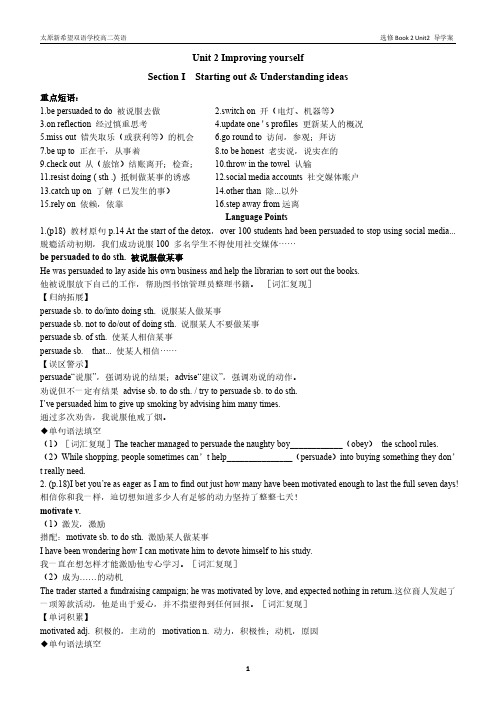
Unit2Improving yourselfSectionⅠStarting out&Understanding ideas重点短语:1.be persuaded to do被说服去做2.switch on开(电灯、机器等)3.on reflection经过慎重思考4.update one's profiles更新某人的概况5.miss out错失取乐(或获利等)的机会6.go round to访问,参观;拜访7.be up to正在干,从事着8.to be honest老实说,说实在的9.check out从(旅馆)结账离开;检查;10.throw in the towel认输11.resist doing(sth.)抵制做某事的诱惑12.social media accounts社交媒体账户13.catch up on了解(已发生的事)14.other than除...以外15.rely on依赖,依靠16.step away from远离Language Points1.(p18)教材原句p.14At the start of the detox,over100students had been persuaded to stop using social media...脱瘾活动初期,我们成功说服100多名学生不得使用社交媒体……be persuaded to do sth.被说服做某事He was persuaded to lay aside his own business and help the librarian to sort out the books.他被说服放下自己的工作,帮助图书馆管理员整理书籍。
[词汇复现]【归纳拓展】persuade sb.to do/into doing sth.说服某人做某事persuade sb.not to do/out of doing sth.说服某人不要做某事persuade sb.of sth.使某人相信某事persuade sb.that...使某人相信……【误区警示】persuade“说服”,强调劝说的结果;advise“建议”,强调劝说的动作。


2021高考英语大一轮复习资料Book2 Unit2话题词汇1.aboard prep.上(船、飞机、火车、汽车等)2.accommodation n.住宿;膳宿3.destination n.目的地;终点4.enjoy v.欣赏;享受乐趣;喜欢5.guide n.导游;向导6.luggage/baggage n.行李7.place of interest名胜8.be struck by...被……迷住9.have a good trip旅行顺利 10.take a picture拍照话题佳作假设你参加了某国际旅行团的意大利三市游(罗马—佛罗伦萨—威尼斯)。
今天你参观的是佛罗伦萨。
请根据下面表格提示,写一篇游记。
参观城市及景点介绍米开朗基罗广场、大卫塑像、乌菲兹美术馆……参观感受及旅游计划佛罗伦萨位于……敬仰古代伟大的艺术家……准备明天进行下一城市的参观(威尼斯) 佳作欣赏 Oct.4th,FridayFine Here I am in Florence,a world-famous tourist city in the middle of Italy.It is not only the most famous cultural art center in Europe,but also the home of the Renaissance.Firstly,I came to the Piazzale Michelangelo,from where I looked over the beautiful sights of the whole city.Then,standing in the middle of the square is the sculpture of David,which is the symbol of the city.I couldn’t help showing my respect to the ancient artists.At last,I came to the Uffizi Gallery,where a lot of artworks are displayed by great artists.I am so attracted by them that I really want to stay here for a few more days.However,I must leave for Venice,another famous city in Italy tomorrow morning. 名师点睛作者能够仔细审题,按照题目要求,出色地将题中的要点表达出来。
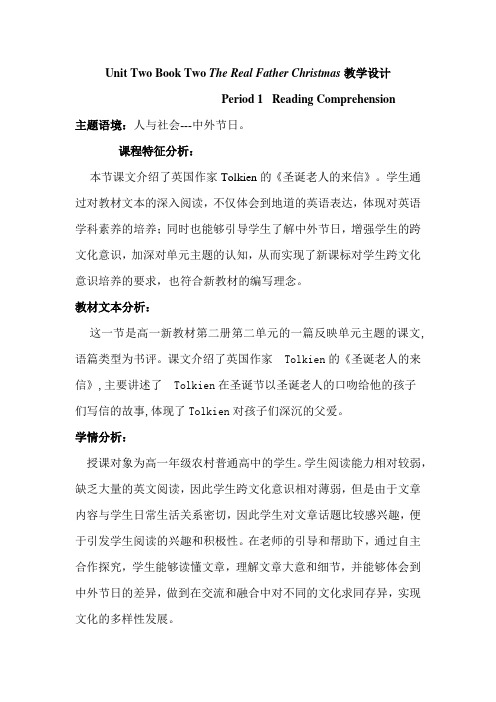
Unit Two Book Two The Real Father Christmas教学设计Period 1 Reading Comprehension主题语境:人与社会---中外节日。
课程特征分析:本节课文介绍了英国作家 Tolkien的《圣诞老人的来信》。
学生通过对教材文本的深入阅读,不仅体会到地道的英语表达,体现对英语学科素养的培养;同时也能够引导学生了解中外节日,增强学生的跨文化意识,加深对单元主题的认知,从而实现了新课标对学生跨文化意识培养的要求,也符合新教材的编写理念。
教材文本分析:这一节是高一新教材第二册第二单元的一篇反映单元主题的课文,语篇类型为书评。
课文介绍了英国作家Tolkien的《圣诞老人的来信》,主要讲述了Tolkien在圣诞节以圣诞老人的口吻给他的孩子们写信的故事,体现了Tolkien对孩子们深沉的父爱。
学情分析:授课对象为高一年级农村普通高中的学生。
学生阅读能力相对较弱,缺乏大量的英文阅读,因此学生跨文化意识相对薄弱,但是由于文章内容与学生日常生活关系密切,因此学生对文章话题比较感兴趣,便于引发学生阅读的兴趣和积极性。
在老师的引导和帮助下,通过自主合作探究,学生能够读懂文章,理解文章大意和细节,并能够体会到中外节日的差异,做到在交流和融合中对不同的文化求同存异,实现文化的多样性发展。
教学重点:引导学生了解书评文章的特点,获取文章中所介绍作品的关键信息;同时熟练掌握重点词汇,语法和句型结构。
教学难点:培养学生的跨文化意识,认识到如何对不同文化求同存异,实现文化多样性发展。
教学目标:1. 引导学生初步了解不同类型的节日,了解不同的节日文化;2. 通过略读,引导学生快速掌握课文内容,初步了解书评的特点,准确理解和解释标题的含义;3. 通过精读,带领学生梳理细节,提高阅读能力。
4. 通过对《圣诞老人来信》一书中所歌颂的奉献精神的理解,引导学生加深对节日意义的理解。
【教学步骤】【Pre-reading】Step 1. Lead-in1. T asks Ss to read the questions in Activity 1 and plays the video.Ss watch a video about festivals in different seasons and answer the questions:(1) What festivals are mentioned in the video?(2) Why do people celebrate these festivals?2. T invites some Ss to share their answers with the class. Ss share their answers with the class.Q1:The festivals mentioned in the video are “hanami”, the Rose Festival, the Mid-Autumn Day, the Harbin international Ice and Snow Festival,and the New Year.Q2:Because people want to celebrate the Changing seasons and express their appreciation of nature.3.T plays the video again,and the whole class check their answers.(设计意图:引导学生初步了解不同类型的节日,了解不同的节日文化,激活学生已有的语言、背景知识,为接下来的学习活动做铺垫和预热,完成第一项教学目标。

Unit TWO Journey into the unknownObjectives1. To learn some new words and phrases2. To practice the listening skill--- understanding the problem-solution pattern3. To talk about asking for and giving directions4. To conduct a series of listening and speaking activities on how to discuss and organize ideas (e.g. pair work, group work, etc.)Focus1. Understanding & using the key words, phrases and expressions in this unit2. Understanding the main idea of the listening material and complete the related exercises3. Practicing the listening skill of understanding the problem-solution pattern4. Practicing the speaking skill--- how to discuss and organize ideasDifficulties1. Understanding the main idea of the listening material and complete the related exercises2. Practicing the listening skill of understanding the problem-solution pattern3. Practicing the speaking skill--- how to discuss and organize ideasStep 1 Opening upRead the following quotes about traveling. What does each quote mean? Do you agree with them? Why or why not?Text book P20Step 2 Listening to the worldSharing1. Watch a podcast for its general idea.The podcast is mainly about people’s traveling experiences and what they like and don’t like about traveling.2. Watch Part 1 and fill in the blanks with the words that Finn uses.1) different countries2) home3) new places4) new cultures3. Do they travel a lot? Look at the people below and read the statements. Then watch part 2 of the podcast and check(√) the true statements.1 Travel is her passion.2 He has been to Istanbul twice.3 She has done little traveling on holidays.4 She gets excited about going to any country.5 She loves to travel to different countries.6 He has been traveling for 12 years.7 She has been to Turkey, India, and Malta.8 As an expedition leader, he often works in the United Kingdom.Answers1 √2(He has been to Istanbul once.)3(she has done quite a bit of traveling on holidays.)4 √5 √6(He has been traveling for about two and a half years.)7(she has been to Turkey, Egypt and Malta.)8(As an expedition leader, he often works outside the United Kingdom.)4. What do they like about traveling? Look at the people below and read the statements. Then watch part 3 of the podcast and fill in the blanks.A He thinks that traveling helps a person 1_______a lot and learn completelydifferent experiences.B She loves the 2______experience.C He loves to see art. And she loves to see 3________in other countries.D He can see the most beautiful4 ________ around the word.E He likes getting out there and experiencing a different 5____, getting far a wayfrom what he’s used to, and meeting new people.F She loves being in a new place, seeing very different things, hearing a different6_____, and eating different food.Now watch again and check your answers.4 Answers1) mature2) airport3) theater4) scenery5) culture6) language5 What don’t they like about traveling? Look at the people below and read the statements. Then watch part 4 of the podcast and match the statements 1-6 to the people A-F.1 I suppose plane journeys aren’t always the most exciting of things.2 I don’t like long flights.3 When I was backpacking, and we all …we ran out of money, or we were in dangerous situations, I actually quite enjoyed that.4 Flying. I don’t particularly like flying, but it’s a necessity when you live in Ireland, you know.5 You spend a lot of time outside the United Kingdom, and the disadvantage of that is, that you, you tend to miss families and friends.6 I suppose the biggest problem I have with traveling is living out of a suitcase.Now watch again and check your answers.AnswersBAECFD6. Work in pairs and discuss the questions.1. Do you like traveling? Why or why not?2. Have you traveled much? Where have you been? What did you like most?3. If you can afford the money and time, which place(s) would you love to go? Why? Reference answers1. I like traveling a lot. It is a good experience since it helps people escape from the pressure of city life and the boredom of daily routine. What’s more, the contact with different cultures helps broaden the mind and probably change our way of living and thinking.I don’t like traveling. I like the stability and the secure, warm feeling of home, which make me feel comfortable. Hotels or other people’s houses are poor substitutes for home, and I really don’t like sleeping in strange places or being away from home for a long time. I don’t get enough out of traveling to justify the discomfort of being away from home.2. I haven’t traveled much so far, but the backpacking trip I had in Yunnan is an unforgettable experience. I walked on foot along the Yangtze river for a long distance, occasionally going down to the valley to appreciate its majestic power and beauty. What I liked most was to drift along the river on a bamboo raft. It seemed to me that the river had a life of its own with the current either drifting in leisure or raging forward with force. Tiring as the trip was, I was greatly rewarded with what I felt and what I experienced.3. If I had enough time and money, I would choose to go to the American west, to visit the deserts, the canyons, and the mountains, and to totally get immersed into the wilderness. Probably only by going deep unto nature can we truly find our true self, our real value, and our relation with others and the world.Step 3 ListeningBEFORE you listen1.Work in pairs and discuss the questions.What do you know about Venice?Venice is a city in danger. What do you think the major problem might be? Listening skillsWHILE you listen2. Read the questions. Then listen to a man’s talk and answer the questions.1 what problem is Venice facing now?2 how serious is the problem?3 what measure is being adopted to save the city?4 what does the speaker think of the measure?5 what advice does the speaker give in order to save the city?Reference answers1 the city is slowly sinking.2 Venice is sinking at a rate of two and a half inches every decade.3 barriers are being put in to try and stop the water getting too high.4 it is a temporary measure.5 put pressure on the government to spend the money it needs to find a permanent solution to the problem.3. Listen to the talk again and check(√) the true statements.Answers1 (ever since the 14th century attempts have been made to save Venice.)2 (there are as many as 40 floods in Venice between march and September every year.)3 √4 √5 √After you listen4. Work in pairs and discuss the questions.1 Can you think of any other problems threatening tourist cities around the world?2 In your opinion, what measures should be taken to tackle the above problems? Step 4 ViewingBefore you view1 Read the program information below and answer the questions.1 What do you know about the five places mentioned in the following program,information?2 Which places do you think is the number one place to see?2 read the statements and the answer choices. Then watch the video clip and choose the best answers.1 According to the program, Bangkok is an important place for____.A tourists around the worldB people of ThailandC temple loversD Buddhists2 To Joanna Lumley, the Masai Mara is so special because___.A it is a fantastic place for studying animal behaviorB the open spaces and wild animals are impressiveC the African sky is particularly cleat and blueD the animals there live in complete freedom……Answers1 D2 B 3B 4C 5D3Read the statements. Then watch the video clip again and fill in the blanks.1With over six million people, it’s big, it’s______and you love it! It’s very good for ____ and the nightlife is great, too.2It’s got lots of clubs, ______, shops, food… everything you _____, really.3Huge open ______ , fantastic animals, just wide open freedom, warmth, _______, and all underneath the great African skies.4To me, Paris is ______, romantic and ________.5And behind Cape Town is the 1,000-meter-high table mountain, with its fantastic_______.6Friendly people, loads of _______.7With every ________ inch of the ______, the colors in the canyon change.8I remember actually sitting there…and I just______.Now watch again and check your answers.Answers1 busy, shopping2 bars, need3 spaces, friendliness4 elegant, expensive5 views6 beaches, cheap7 changing, sunset8 cried4. Discuss the questions.1. Which places in the world would you like to visit? Make a list of three places and give your reasons.2. Which attracts you more: a natural or cultural landscape? Why? Assignments:1. Reviewing new words and phrases of Unit 12. Listening to “Further Practice in Listening” again after class.3. Working in pairs and practice how to discuss and organize ideas.。
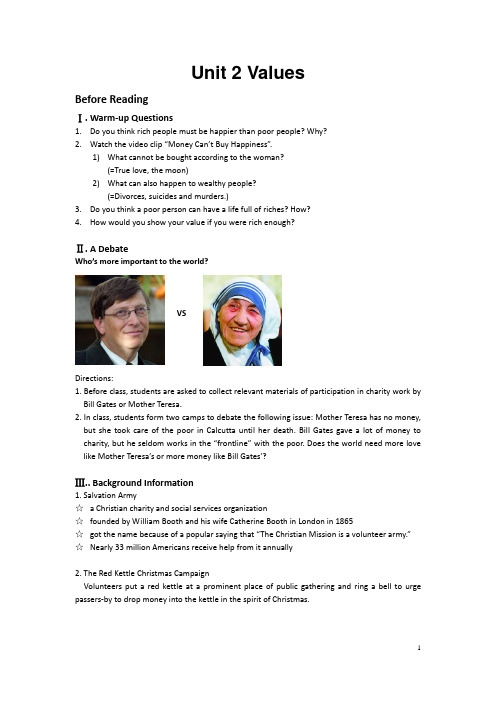
Unit 2 ValuesBefore ReadingⅠ. Warm-up Questions1.Do you think rich people must be happier than poor people? Why?2.Watch the video clip “Money Can’t Buy Happiness”.1)What cannot be bought according to the woman?(=True love, the moon)2)What can also happen to wealthy people?(=Divorces, suicides and murders.)3.Do you think a poor person can have a life full of riches? How?4.How would you show your value if you were rich enough?Ⅱ. A DebateWho’s more important to the world?VSDirections:1. Before class, students are asked to collect relevant materials of participation in charity work by Bill Gates or Mother Teresa.2. In class, students form two camps to debate the following issue: Mother Teresa has no money, but she took care of the poor in Calcutta until her death. Bill Gates gave a lot of money to charity, but he seldom works in the “frontline” with the poor. Does the world need more love like Mother Teresa’s or more money like Bill Gates’?Ⅲ.. Background Information1. Salvation Army☆ a Christian charity and social services organization☆founded by William Booth and his wife Catherine Booth in London in 1865☆got the name because of a popular saying that “The Christian Mission is a volunteer army.”☆Nearly 33 million Americans receive help from it annually2. The Red Kettle Christmas CampaignVolunteers put a red kettle at a prominent place of public gathering and ring a bell to urge passers-by to drop money into the kettle in the spirit of Christmas.3. Wal-Mart4. Personal Income Tax in the US:a progressive tax on the taxable income from the federalgovernment of the USindividualpersonal income taxes from some state and municipal governmentsGlobal ReadingⅠ. Part Division of the TextⅡ. Further UnderstandingFor Part 1ⅰ. Table Completionii. Difficult Sentences1. (LL. 1~2) It was early December 2003, my first season as a Salvation Army bell ringer, when Iwas confronted with the question.1). What does a Salvation Army bell ringer do?(=To ring the bell and ask people to donate money to help the poor.)2). Translate this sentence into Chinese.(=首次面对这个问题,是在2003年12月初我第一次为救世军摇铃募捐的时候。

Unit TWO Journey into the unknownObjectives1. To learn some new words and phrases2. To practice the listening skill--- understanding the problem-solution pattern3. To talk about asking for and giving directions4. To conduct a series of listening and speaking activities on how to discuss and organize ideas (e.g. pair work, group work, etc.)Focus1. Understanding & using the key words, phrases and expressions in this unit2. Understanding the main idea of the listening material and complete the related exercises3. Practicing the listening skill of understanding the problem-solution pattern4. Practicing the speaking skill--- how to discuss and organize ideasDifficulties1. Understanding the main idea of the listening material and complete the related exercises2. Practicing the listening skill of understanding the problem-solution pattern3. Practicing the speaking skill--- how to discuss and organize ideasStep 1 Opening upRead the following quotes about traveling. What does each quote mean? Do you agree with them? Why or why not?Text book P20Step 2 Listening to the worldSharing1. Watch a podcast for its general idea.The podcast is mainly about people’s traveling experiences and what they like and don’t like about traveling.2. Watch Part 1 and fill in the blanks with the words that Finn uses.1) different countries2) home3) new places4) new cultures3. Do they travel a lot? Look at the people below and read the statements. Then watch part 2 of the podcast and check(√) the true statements.1 Travel is her passion.2 He has been to Istanbul twice.3 She has done little traveling on holidays.4 She gets excited about going to any country.5 She loves to travel to different countries.6 He has been traveling for 12 years.7 She has been to Turkey, India, and Malta.8 As an expedition leader, he often works in the United Kingdom.Answers1 √2(He has been to Istanbul once.)3(she has done quite a bit of traveling on holidays.)4 √5 √6(He has been traveling for about two and a half years.)7(she has been to Turkey, Egypt and Malta.)8(As an expedition leader, he often works outside the United Kingdom.)4. What do they like about traveling? Look at the people below and read the statements. Then watch part 3 of the podcast and fill in the blanks.A He thinks that traveling helps a person 1_______a lot and learn completelydifferent experiences.B She loves the 2______experience.C He loves to see art. And she loves to see 3________in other countries.D He can see the most beautiful4 ________ around the word.E He likes getting out there and experiencing a different 5____, getting far a wayfrom what he’s used to, and meeting new people.F She loves being in a new place, seeing very different things, hearing a different6_____, and eating different food.Now watch again and check your answers.4 Answers1) mature2) airport3) theater4) scenery5) culture6) language5 What don’t they like about traveling? Look at the people below and read the statements. Then watch part 4 of the podcast and match the statements 1-6 to the people A-F.1 I suppose plane journeys aren’t always the most exciting of things.2 I don’t like long flights.3 When I was backpacking, and we all …we ran out of money, or we were in dangerous situations, I actually quite enjoyed that.4 Flying. I don’t particularly like flying, but it’s a necessity when you live in Ireland, you know.5 You spend a lot of time outside the United Kingdom, and the disadvantage of that is, that you, you tend to miss families and friends.6 I suppose the biggest problem I have with traveling is living out of a suitcase.Now watch again and check your answers.AnswersBAECFD6. Work in pairs and discuss the questions.1. Do you like traveling? Why or why not?2. Have you traveled much? Where have you been? What did you like most?3. If you can afford the money and time, which place(s) would you love to go? Why? Reference answers1. I like traveling a lot. It is a good experience since it helps people escape from the pressure of city life and the boredom of daily routine. What’s more, the contact with different cultures helps broaden the mind and probably change our way of living and thinking.I don’t like traveling. I like the stability and the secure, warm feeling of home, which make me feel comfortable. Hotels or other people’s houses are poor substitutes for home, and I really don’t like sleeping in strange places or being away from home for a long time. I don’t get enough out of traveling to justify the discomfort of being away from home.2. I haven’t traveled much so far, but the backpacking trip I had in Yunnan is an unforgettable experience. I walked on foot along the Yangtze river for a long distance, occasionally going down to the valley to appreciate its majestic power and beauty. What I liked most was to drift along the river on a bamboo raft. It seemed to me that the river had a life of its own with the current either drifting in leisure or raging forward with force. Tiring as the trip was, I was greatly rewarded with what I felt and what I experienced.3. If I had enough time and money, I would choose to go to the American west, to visit the deserts, the canyons, and the mountains, and to totally get immersed into the wilderness. Probably only by going deep unto nature can we truly find our true self, our real value, and our relation with others and the world.Step 3 ListeningBEFORE you listen1.Work in pairs and discuss the questions.What do you know about Venice?Venice is a city in danger. What do you think the major problem might be? Listening skillsWHILE you listen2. Read the questions. Then listen to a man’s talk and answer the questions.1 what problem is Venice facing now?2 how serious is the problem?3 what measure is being adopted to save the city?4 what does the speaker think of the measure?5 what advice does the speaker give in order to save the city?Reference answers1 the city is slowly sinking.2 Venice is sinking at a rate of two and a half inches every decade.3 barriers are being put in to try and stop the water getting too high.4 it is a temporary measure.5 put pressure on the government to spend the money it needs to find a permanent solution to the problem.3. Listen to the talk again and check(√) the true statements.Answers1 (ever since the 14th century attempts have been made to save Venice.)2 (there are as many as 40 floods in Venice between march and September every year.)3 √4 √5 √After you listen4. Work in pairs and discuss the questions.1 Can you think of any other problems threatening tourist cities around the world?2 In your opinion, what measures should be taken to tackle the above problems? Step 4 ViewingBefore you view1 Read the program information below and answer the questions.1 What do you know about the five places mentioned in the following program,information?2 Which places do you think is the number one place to see?2 read the statements and the answer choices. Then watch the video clip and choose the best answers.1 According to the program, Bangkok is an important place for____.A tourists around the worldB people of ThailandC temple loversD Buddhists2 To Joanna Lumley, the Masai Mara is so special because___.A it is a fantastic place for studying animal behaviorB the open spaces and wild animals are impressiveC the African sky is particularly cleat and blueD the animals there live in complete freedom……Answers1 D2 B 3B 4C 5D3Read the statements. Then watch the video clip again and fill in the blanks.1With over six million people, it’s big, it’s______and you love it! It’s very good for ____ and the nightlife is great, too.2It’s got lots of clubs, ______, shops, food… everything you _____, really.3Huge open ______ , fantastic animals, just wide open freedom, warmth, _______, and all underneath the great African skies.4To me, Paris is ______, romantic and ________.5And behind Cape Town is the 1,000-meter-high table mountain, with its fantastic_______.6Friendly people, loads of _______.7With every ________ inch of the ______, the colors in the canyon change.8I remember actually sitting there…and I just______.Now watch again and check your answers.Answers1 busy, shopping2 bars, need3 spaces, friendliness4 elegant, expensive5 views6 beaches, cheap7 changing, sunset8 cried4. Discuss the questions.1. Which places in the world would you like to visit? Make a list of three places and give your reasons.2. Which attracts you more: a natural or cultural landscape? Why? Assignments:1. Reviewing new words and phrases of Unit 12. Listening to “Further Practice in Listening” again after class.3. Working in pairs and practice how to discuss and organize ideas.。

Unit 2, Book 2II Listening SkillsMaking inferences1.W: From what I can remember, the director asked us to rehearse this a hundred times.M: One hundred times? Is the director out of his mind?Q: What does the man imply?2. M: Do you think we have made enough food for the party?W: The refrigerator is about to explore.Q: What does the woman imply?3. W: She said she might become a famous movie star.M: Y es, and pigs might fly.Q: What does the man mean?4. M: Although the man often plays a bad guy in movies, in real life he has a heart of gold.W: So does a hard-boiled egg.Q: What does the woman mean?5. W: What a beautiful sunset!M: Don‟t blink. Y ou might just miss it.Q : What does the man mean?III. Listening INTask 1: Waiting for the New Harry Potter MovieAmy: I‟m so excited about finally seeing this movie!Peter: Me too. I‟m crazy about Harry Potter. Have you heard that J.K. Rowling has added another book to the series?Amy: She‟s already written Book Seven? I‟m still waiting for Book Five…Peter: I know. Who isn‟t? At least we have the movies to watch in the meantime.Amy: By the way, have you seen the trailer yet?Peter: Yeah. It was great! I think the movie itself will be really scary.Amy: It surely will! All that writing on the wall in blood … It scares me to death just to think about it!Excited/crazy; book; Seven; Book Five; the trailer; scary; the writing; in blood Task 2: A Great ActorThere was once a great actor who could no longer remember his lines. After several years of searching, he finally found a theater that was willing to give him a try. The director said, “This is the most important part, and it has only one line. At the opening you walk onto stage carrying a rose. Y ou hold the rose to your nose with just one finger and thumb, smell it deeply and them say the line in praise of the rose: …Ah, the sweet smell of my love.‟” The actor was excited. All day long before the play he practiced his line over and over again. Finally, the time came. The curtain went up, the actor walked onto the stage, looked at the audience, and with great emotion said theline, “Ah, the sweet smell of my love.” The audience exploded in laughter. Only the director was furious! “Ahhhhhh! Y ou damned fool!”he cried. “Y ou‟ve ruined my play! Y ou‟ve ruined me!”The actor was puzzled, “What happened? Did I forget my line?”“No!” shouted the director. “Y ou forgot the rose!”1. D2. C3. D4. A5. BTask 3: Movie ReviewsI love movies! And after I see them, I like to comment on them. These are movies I saw this year that I would like to recommend: Among comedies I highly recommend “Monsoon Wedding”. It‟s an Indian movie. The story is about an Indian wedding. Preparations for the wedding bring out funny and sad situations touching on love and a past rape. This movie shows some of the wonderful customs of India, and the importance of family and love. It‟s great!Among dramas, I like “Adaptation”. It is an excellent movie! But for me the first part of the movie was too fast to follow. I hope to see it again on DVD with captions.“The Pianist” is set in the Second World War. It‟s about a young Polish-Jewish pianist, who lives in Warsaw with his family. The Nazis sent his family to die in the concentration camps. He was safe, but would have died without unusually good luck and the kindness of a few non-Jews. This is a powerful movie with thought-provoking themes.“Rabbit-Proof Fence” is set in the 1930s in Australia, and it‟s based on real events. It is about three native girls who are separated from their families by the racist police who send them to special centers. There the girls are taught practical skills, and the government tries to integrate them into white Australian society. They ran away from the camp and walk 1,500 miles to find their mothers. This is a sad, touching story that you should not miss.1. He likes to see movies and comment on them2. Four3. Three4. Onewedding, love and a past rape; customs, family and lovefast, on DVD; concentration camps, sage, luck, the kindness;native girls; from their families, special centers; integrate;ran away, 1,500 miles, mothersIV. Speaking OutModel 1Sample dialogueA: Hi, are you busy this weekend?B: Y es. What‟s on your mind?A: I‟ve got two tickets for the car exhibition. Would you like to go with me?B: Sure. Thanks for your invitation.A: It‟s nothing.B: I‟ve been wanting to see the exhibition, but it was not at all easy to get a ticket. How did you manage to get two tickets?A: A friend of mine works at the exhibition center. She was able to get three free tickets.B: Wow, people are paying almost 100 yuan for a ticket on the black market. Thank you verymuch indeed for inviting me.A: No problem.Model 2Sample dialogueA: What did you think about The Lion King?B: Well … I think this cartoon was pretty good, but not as good as Beauty and the Beast. It‟s a killer flick (…a killer flick‟ means …a great movie‟).A: Really? But I think The Lion King was unbelievably good.B: I thought it was just OK. Why do you think so?A: Well, it‟s so interesting that the lives of the lions were similar to the lives of human beings. B: Y ou‟re right. The murder in The Lion King was almost the same as the murder in the Shakespearean play Hamlet.Model 3Sample dialogueA: What do you think about the movie?B: I think the plot was first-rate. But I don‟t think the character development was so strong.A: Yes, the characterization was rather weak. Do you think it is because of the casting of the movie?B: No, the cast was strong. But the acting was rather poor. And the lines are not interesting at all. A: Well, maybe. But I liked the heroine of the movie. She is excellent.B: Y eah, I liked her too. She‟s adorable!V. Let‟s TalkAlfred HitchcockAlfred Hitchcock was a British director. His movies frequently show innocent people caught up in situations beyond their control or even understanding.Hitchcock preferred the use of suspense to surprise in his movies. In surprise, the director provides the viewer with frightening things. In suspense, the director tells or show things to the audience which the characters in the movie do not know, and then skillfully builds up tension around what will happen when the characters finally learn the truth. Hitchcock had a great sense of humor. Once at a French airport, a suspicious customs official looked at Hitchcock‟s passport, which was marked simply PRODUCER. The curious official asked, “And what do you produce?”“Gooseflesh.” replied Hitchcock.Alfred Hitchcock always managed to make a brief appearance in hisw movies: He was sometimes getting on a bus, or crossing a street, or walking in front of a store, or across the courtyard in an apartment. However, for the movie Lifeboat in 1944, he was faced with a difficult problem. The entire movie was set in a lifeboat out at sea, and there were only a few characters in the boat. Originally, he wanted to float by as a dead body, but he was afraid he‟d sink! His clever solution was to place a photograph of himself in a newspaper that one of the characters read during thecourse of the movie.VI. Further Listening and SpeakingTask 1: Only One LinePeter had always wanted to be an actor, but never succeeded because he had a hard time memorizing lines. A friend of his told him about a small part in a play. He promised Peter that he could do it because he‟d only have to remember on line. Peter decided to take the part. His only line was, “Listen, I hear the guns roar!”Peter practiced and practiced, “Listen, I hear the guns roar!” On the opening night of the play Peter was very nervous. Backstage, he practiced his line, over and over again, “Listen, I hear the guns roar! Listen, I hear the guns roar!” Finally came his turn, Peter went onto stage. He heard a loud BOOM and cried out in spite of himself (不由自主地), “WHA T THE HELL WAS THA T?”1.memorization lines2. remember one line3. I hear the guns roar4. a loud boom5. his lineTask 2: An Interview with J.K RowlingQ: How did you get the idea for Harry Potter?A: I was traveling on a train between Manchester and London and the idea for Harry just fell into my head. At that point it was essentially the idea for a boy who didn‟t know he was a wizard.Q: Did you always plan to write Harry‟s story in more than one book? If so, how many?A: I always conceived it as a seven-book series because I decided that it would take seven years, from age eleven to seventeen, inclusive, to train as a wizard, and each of the books would deal with one year of Harry‟s life at the school.Q: Any clues about the next book?A: I don‟t want to give anything away, but I can tell you that the books are getting darker. Harry‟s going to have quite a bit to deal with as he gets older. Sorry if they get too scary!Q: Of the many things you must have heard people say about Harry Potter, w hat are some of your favorites?A: My very favorite was from a twelve-year-old Scottish girl who came to hear me read at the Edinburgh book festival. At the end of the festival, the queue for signing was very long. When the girl finally reached me, she said, “I don‟t W ANT there to be so many people here, because this is MY books!” That is exactly how I feel about my favorite books. Nobody else has a right to know them; let alone like them!1. T2. F3. F4. T5. FTask 3: The Secret of the Next Harry Potter BookThe Harry Potter books rapidly became one of the most in-demand book series among young readers and have earned large sums of money. Movies based on the books won several Oscar nominations. Readers are now keen to know the plot of the next book.Harry Potter movie fans will get a long-awaited treat. The movie Harry Potter and the Chamber of Secrets is finally about to come out. This time around, Harry discovers a frightening secret at Hogwarts School. Eager readers of the first four Harry Potter books are also trying to discover a secret, the secret plot of the fifth book in the series. Because of the long wait since Book Four,they are guessing many things. Some think that Professor Lupin will die or that Harry and his friend Ron may be related!J.K Rowling herself has only said that Book Five will be shorter and scarier than Book Four. To make sure her readers hear only rumor, she locks all her ideas for the books in a hidden place. Since the next book does not come out until 2003, for now Harry‟s secret is safe with her!1. D2. C3. A$. B。
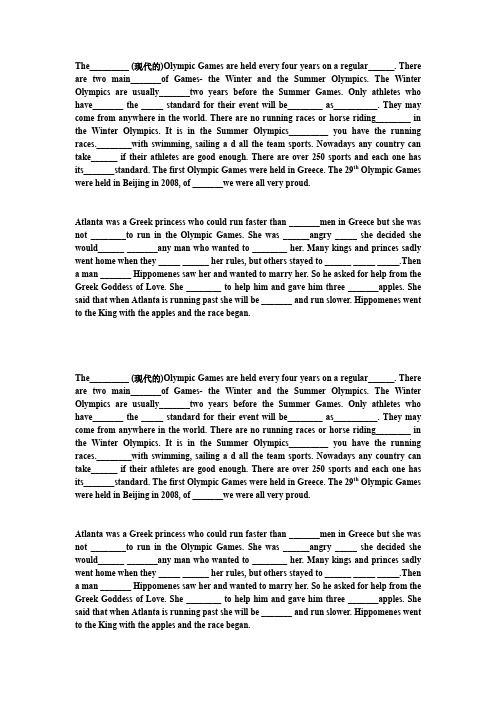
are two main_______of Games- the Winter and the Summer Olympics. The Winter Olympics are usually_______two years before the Summer Games. Only athletes who have_______ the _____ standard for their event will be________ as__________. They may come from anywhere in the world. There are no running races or horse riding________ in the Winter Olympics. It is in the Summer Olympics_________ you have the running races.________with swimming, sailing a d all the team sports. Nowadays any country can take______ if their athletes are good enough. There are over 250 sports and each one has its_______standard. The first Olympic Games were held in Greece. The 29th Olympic Games were held in Beijing in 2008, of _______we were all very proud.Atlanta was a Greek princess who could run faster than _______men in Greece but she was not ________to run in the Olympic Games. She was ______angry _____ she decided she would______ _______any man who wanted to ________ her. Many kings and princes sadly went home when they _____ ______ her rules, but others stayed to ______ _____ _____.Then a man _______ Hippomenes saw her and wanted to marry her. So he asked for help from the Greek Goddess of Love. She ________ to help him and gave him three _______apples. She said that when Atlanta is running past she will be _______ and run slower. Hippomenes went to the King with the apples and the race began.The_________ (现代的)Olympic Games are held every four years on a regular______. There are two main_______of Games- the Winter and the Summer Olympics. The Winter Olympics are usually_______two years before the Summer Games. Only athletes who have_______ the _____ standard for their event will be________ as__________. They may come from anywhere in the world. There are no running races or horse riding________ in the Winter Olympics. It is in the Summer Olympics_________ you have the running races.________with swimming, sailing a d all the team sports. Nowadays any country can take______ if their athletes are good enough. There are over 250 sports and each one has its_______standard. The first Olympic Games were held in Greece. The 29th Olympic Games were held in Beijing in 2008, of _______we were all very proud.Atlanta was a Greek princess who could run faster than _______men in Greece but she was not ________to run in the Olympic Games. She was ______angry _____ she decided she would______ _______any man who wanted to ________ her. Many kings and princes sadly went home when they _____ ______ her rules, but others stayed to ______ _____ _____.Then a man _______ Hippomenes saw her and wanted to marry her. So he asked for help from the Greek Goddess of Love. She ________ to help him and gave him three _______apples. She said that when Atlanta is running past she will be _______ and run slower. Hippomenes went to the King with the apples and the race began.There are two main__sets___of Games- the Winter and the Summer Olympics. The Winter Olympics are usually__held__two years before the Summer Games. Only athletes who have_reached__ the _agreed_ standard for their event will be__admitted__ as_competitors_. They may come from anywhere in the world. There are no running races or horse riding__events__ in the Winter Olympics. It is in the Summer Olympics__that__ you have the running races.___together___with swimming, sailing a d all the team sports. Nowadays any country can take_ part__ if their athletes are good enough. There are over 250 sports and each one has its__own__standard. The first Olympic Games were held in Greece. The 29th Olympic Games were held in Beijing in 2008, of __which___we were all very proud.Atlanta was a Greek princess who could run faster than _any__men in Greece but she was not __allowed__to run in the Olympic Games. She was __so__angry _that__ she decided she would__run__ _against___any man who wanted to __marry___ her. Many kings and princes sadly went home when they _heard_ _of__ her rules, but others stayed to _run_ _the_ _race_.Then a man __called_ Hippomenes saw her and wanted to marry her. So he asked for help from the Greek Goddess of Love. She _promised__ to help him and gave him three _golden_apples. She said that when Atlanta is running past she will be __relaxed__ and run slower. Hippomenes went to the King with the apples and the race began.The__present-day_ (现代的)Olympic Games are held every four years on a regular_ basis__. There are two main__sets___of Games- the Winter and the Summer Olympics. The Winter Olympics are usually__held__two years before the Summer Games. Only athletes who have_reached__ the _agreed_ standard for their event will be__admitted__ as_competitors_. They may come from anywhere in the world. There are no running races or horse riding__events__ in the Winter Olympics. It is in the Summer Olympics__that__ you have the running races.___together___with swimming, sailing a d all the team sports. Nowadays any country can take_ part__ if their athletes are good enough. There are over 250 sports and each one has its__own__standard. The first Olympic Games were held in Greece. The 29th Olympic Games were held in Beijing in 2008, of __which___we were all very proud.Atlanta was a Greek princess who could run faster than _any__men in Greece but she was not __allowed__to run in the Olympic Games. She was __so__angry _that__ she decided she would__run__ _against___any man who wanted to __marry___ her. Many kings and princes sadly went home when they _heard_ _of__ her rules, but others stayed to _run_ _the_ _race_.Then a man __called_ Hippomenes saw her and wanted to marry her. So he asked for help from the Greek Goddess of Love. She _promised__ to help him and gave him three _golden_apples. She said that when Atlanta is running past she will be __relaxed__ and run slower. Hippomenes went to the King with the apples and the race began.。
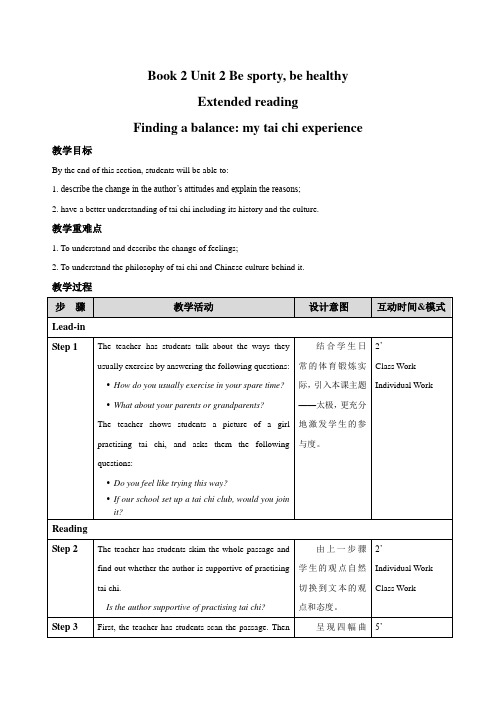
Book 2 Unit 2 Be sporty, be healthyExtended readingFinding a balance: my tai chi experience 教学目标By the end of this section, students will be able to:1. describe the change in the author’s attitudes and explain the reasons;2. have a better understanding of tai chi including its history and the culture.教学重难点1. To understand and describe the change of feelings;2. To understand the philosophy of tai chi and Chinese culture behind it.教学过程he/she provides them with some graphs and has them choose the one that best describes the change in the author’s attitudes.Sample answer: D. 线图,让学生阅读文本,并选择最能表达作者兴趣变化的一幅,把抽象的心态具象化。
Individual WorkClass WorkStep 4 The teacher has students read the passage again. Then encourages students to find out an adjective to reflectthe author’s attitudes in different periods with the helpof Graph D and give reasons.Sample answer:The first adjective is “hesitant”. At the ver ybeginning, when the author was suggested by herfriend joining the Tai Chi Club, he believed it wasfor old people. Then he felt “amazed” because hefelt tai chi classes were fun and easy, not like whathe had thought before. The third one is “bored”.After learning the basics of tai chi in those first few通过让学生寻找形容词,引导学生在文中定位相关信息,将作者的心态变化自然而然地分为几个阶段,更好地描述作者的心态转变过程。
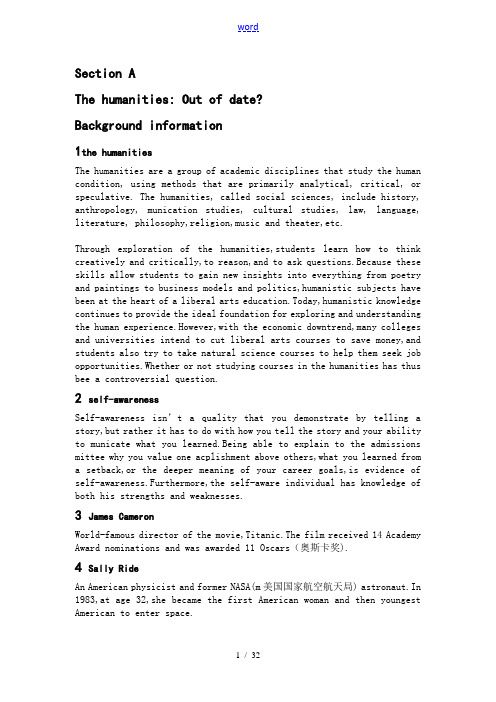
Section AThe humanities: Out of date?Background information1the humanitiesThe humanities are a group of academic disciplines that study the human condition, using methods that are primarily analytical, critical, or speculative. The humanities, called social sciences, include history, anthropology, munication studies, cultural studies, law, language, literature, philosophy,religion,music and theater,etc.Through exploration of the humanities,students learn how to think creatively and critically,to reason,and to ask questions.Because these skills allow students to gain new insights into everything from poetry and paintings to business models and politics,humanistic subjects have been at the heart of a liberal arts education.Today,humanistic knowledge continues to provide the ideal foundation for exploring and understanding the human experience.However,with the economic downtrend,many colleges and universities intend to cut liberal arts courses to save money,and students also try to take natural science courses to help them seek job opportunities.Whether or not studying courses in the humanities has thus bee a controversial question.2 self-awarenessSelf-awareness isn’t a quality that you demonstrate by telling a story,but rather it has to do with how you tell the story and your ability to municate what you learned.Being able to explain to the admissions mittee why you value one acplishment above others,what you learned from a setback,or the deeper meaning of your career goals,is evidence of self-awareness.Furthermore,the self-aware individual has knowledge of both his strengths and weaknesses.3 James CameronWorld-famous director of the movie,Titanic.The film received 14 Academy Award nominations and was awarded 11 Oscars(奥斯卡奖).4 Sally RideAn American physicist and former NASA(m美国国家航空航天局) astronaut.In 1983,at age 32,she became the first American woman and then youngest American to enter space.5 Bruce LeeA Chinese-American actor,martial arts instructor,philosopher,film director,film producer,and screenwriter.He was considered the most influential martial artist and a cultural icon.Born in San Francisco,he was raised in Hong Kong until his late teens.He moved back to the United States at 18 and studied philosophy at Washington University.6Gwyneth PaltrowAn American actress and singer.She gained worldwide recognition through her performance in Shakesperar in Love(1998),for which she won an Academy Award for Best Actress.7 Renee ZellwegerAn American actress and producer.She received two nominations for the Academy Award for Best Actress and won the Academy Award for Best Supporting Actress.8 Matt DamonAn American actor and screenwriter.He and his friend Ben Affleck won the Academy Award for Best Original Screenplay and the Golden Globe Award (金球奖) for Best Screenplay for their work—Good Will Hunting(1997).He also got multiple Best Actor nominations.9 Harold VarmusAn American Nobel Prize-winning scientist and the 14th and current Director of the National Cancer Institute.He was a co-recipient of the 1989 Nobel Prize in Physiology or Medicine for their work on the origins of cancer.10 Michael EisnerAn American businessman.He was the chief executive officer of The Walt Disney pany from 1984 until 2005.Detailed study of the text1 when the going gets tough,the tough take accounting.(Para.1)Meaning:When conditions or situations bee difficult,determined people choose to study the subject of accounting,hoping they can more easily find a job in the future.when the going gets tough:when the situation bees difficult当形势变得严峻时When the going gets tough,women can get as tough as men.当形势变得严峻时,女人可以变得跟男人一样坚强。
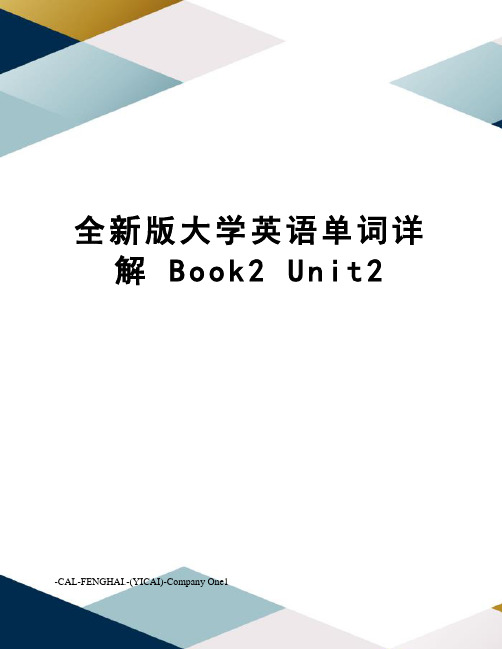
全新版大学英语单词详解B o o k2U n i t2-CAL-FENGHAI.-(YICAI)-Company One1Unit 2 ValuesText A A Life Full of Riches1. (L. 2) confront: vt.1) (of a problem, difficulty, etc.) face (sb.) threateningly* The difficulties that confront us seem insuperable.* A major difficulty that confronts international students is how best to judge the quality of a program in a foreign university.2) (of a person) face and deal with (a problem, difficulty, etc.)军人必须面对危险和死亡。
(=A soldier has to confront danger and death.)* Astronauts have to confront the unknown.be confronted with: be brought face to face(=The prisoner was confronted with his accusers.)* conclusions that can be confronted with experience2. (L. 3) donation: n. money or goods given for a good cause* The hospital receives a good deal of money in donations.他们对慈善事业慷慨捐助。
(=They made a generous donation to charity.)Collocation:a blood donation 献血make/give a donation 捐赠promise a donation 允诺捐助3. (L. 5) confusion: n. a state of uncertainty about what sth. means, etc.* The enemy retreated in great confusion.他们的突然到来打乱了我们的计划。

大学英语book2课文翻译翻译是在准确、通顺的基础上,把一种语言信息转变成另一种语言信息的行为。
下面,是大学英语book2课文翻译的内容,提供给大家参考学习!大学英语book2课文翻译Unit 1 Are You a 1960s Type Student? 大学已不再特别了If you can remember anything about the 1960s, you weren't really there," so the saying goes. It may be true for those who spent their college years in a haze of marijuana smoke. But there is one thing everyone remembers about the 1960s: Going to college was the most exciting and stimulating experience of your life.In the 1960s, California's colleges and universities had transformed the state into the world's seventh largest economy. However, Berkeley, the University of California's main campus, was also well-known for its student demonstrations and strikes, and its atmosphere of political radicalism. When Ronald Reagan ran for office as governor of California in 1966, he asked if Californians would allow "a great university to be brought to its knees by a noisy, dissident minority". The liberals replied that it was the ability to tolerate noisy, dissident minorities which made universities great.On university campuses in Europe, mass socialist or communist movements gave rise to increasingly violent clashes between the establishment and the college students, with their new and passionate commitment to freedom and justice. Much of the protest was about the Vietnam War. But in France, the students of the Sorbonne in Paris managed to form an alliance with the trade unions and to launch a general strike, whichultimately brought about the resignation of President de Gaulle.It wasn't just the activism that characterized student life in the 1960s. Everywhere, going to college meant your first taste of real freedom, of late nights in the dorm or in the Junior Common Room, discussing the meaning of life. You used to have to go to college to read your first forbidden book, see your first indie film, or find someone who shared your passion, for Jimi Hendrix or Lenny Bruce. It was a moment of unimaginable freedom, the most liberating in your life:But where's the passion today? What's the matter with college? These days political, social and creative awakening seems to happen not because of college, but in spite of it. Of course, it's true that higher education is still important. For example, in the UK, Prime Minister Blair was close to achieving his aim of getting 50 per cent of all under thirties into college by 2010 (even though a cynic would say that this was to keep them off the unemployment statistics). Yet college education is no longer a topic of great national importance. T oday, college is seen as a kind of small town from which people are keen to escape. Some people drop out, but the most apathetic stay the course because it's too much effort to leave.Instead of the heady atmosphere of freedom which students in the1960s discovered, students today are much more serious. The British Council has recently done research into the factors which help international students decide where to study. In descending order these are: quality of courses, employability prospects, affordability, personal security issues, lifestyle, and accessibility. College has become a means to an end, an opportunity to increase one's chances on the employment market, and not an end in itself, which gives you the chance toimagine, just for a short while, that you can change the world.The gap between childhood and college has shrunk, and so has the gap between college and the real world. One of the reasons may be financial. In an uncertain world, many children rely on their parents' support much longer than they used to. Students leaving university in the 21st century simply cannot afford to set up their own home because it's too expensive. Another possible reason is the communications revolution. Gone are the days when a son or daughter rang home once or twice a term. Today students are umbilically linked to their parents by their cell phones. And as for finding like-minded friends to share a passion for obscure literature or music, well, we have the Internet and chat rooms to help us do that."Bliss was it in that dawn to be alive,But to be young was very heaven!"Wordsworth may have written these lines about the French Revolution; but they were also true for the students of the 1960s. So why aren't they true for the students of today?有这么一种说法:“要是你能记得20世纪60年代的任何事情,你就没有真正经历过那段岁月。
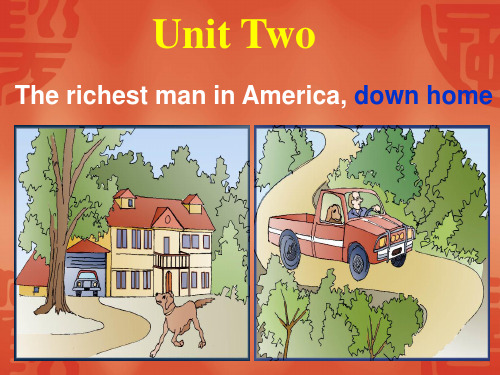
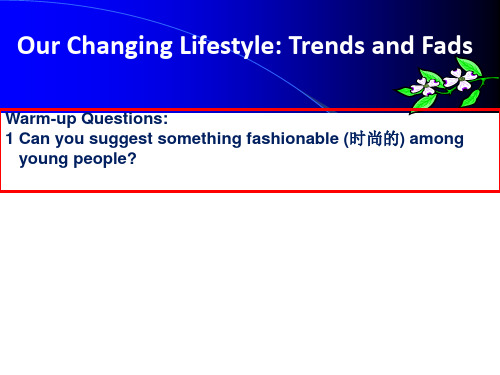
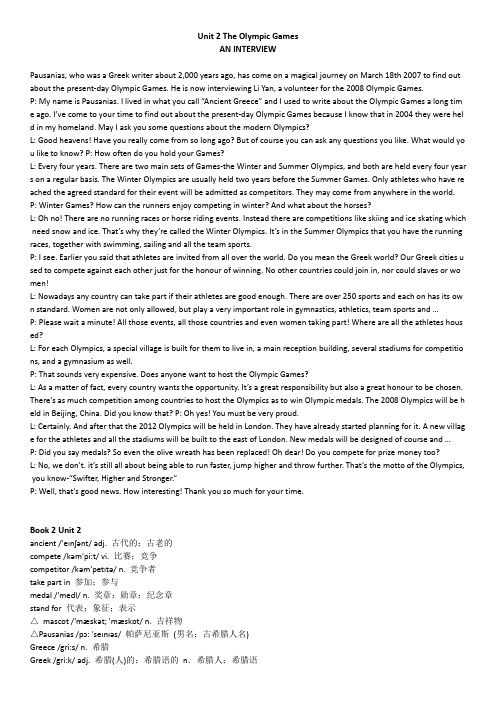
Unit2The Olympic GamesAN INTERVIEWPausanias,who was a Greek writer about2,000years ago,has come on a magical journey on March18th2007to find out about the present-day Olympic Games.He is now interviewing Li Yan,a volunteer for the2008Olympic Games.P:My name is Pausanias.I lived in what you call“Ancient Greece”and I used to write about the Olympic Games a long tim e ago.I’ve come to your time to find out about the present-day Olympic Games because I know that in2004they were hel d in my homeland.May I ask you some questions about the modern Olympics?L:Good heavens!Have you really come from so long ago?But of course you can ask any questions you like.What would yo u like to know?P:How often do you hold your Games?L:Every four years.There are two main sets of Games-the Winter and Summer Olympics,and both are held every four year s on a regular basis.The Winter Olympics are usually held two years before the Summer Games.Only athletes who have re ached the agreed standard for their event will be admitted as competitors.They may come from anywhere in the world. P:Winter Games?How can the runners enjoy competing in winter?And what about the horses?L:Oh no!There are no running races or horse riding events.Instead there are competitions like skiing and ice skating which need snow and ice.That’s why they’re called the Winter Olympics.It’s in the Summer Olympics that you have the running races,together with swimming,sailing and all the team sports.P:I see.Earlier you said that athletes are invited from all over the world.Do you mean the Greek world?Our Greek cities u sed to compete against each other just for the honour of winning.No other countries could join in,nor could slaves or wo men!L:Nowadays any country can take part if their athletes are good enough.There are over250sports and each on has its ow n standard.Women are not only allowed,but play a very important role in gymnastics,athletics,team sports and…P:Please wait a minute!All those events,all those countries and even women taking part!Where are all the athletes hous ed?L:For each Olympics,a special village is built for them to live in,a main reception building,several stadiums for competitio ns,and a gymnasium as well.P:That sounds very expensive.Does anyone want to host the Olympic Games?L:As a matter of fact,every country wants the opportunity.It’s a great responsibility but also a great honour to be chosen. There’s as much competition among countries to host the Olympics as to win Olympic medals.The2008Olympics will be h eld in Beijing,China.Did you know that?P:Oh yes!You must be very proud.L:Certainly.And after that the2012Olympics will be held in London.They have already started planning for it.A new villag e for the athletes and all the stadiums will be built to the east of London.New medals will be designed of course and…P:Did you say medals?So even the olive wreath has been replaced!Oh dear!Do you compete for prize money too?L:No,we don’t.it’s still all about being able to run faster,jump higher and throw further.That’s the motto of the Olympics, you know-“Swifter,Higher and Stronger.”P:Well,that’s good news.How interesting!Thank you so much for your time.Book 2 Unit 2ancient /'eɪnʃənt/ adj. 古代的;古老的compete /kəm'pi:t/ vi. 比赛;竞争competitor /kəm'petɪtə/ n. 竞争者take part in 参加;参与medal /'medl/ n. 奖章;勋章;纪念章stand for 代表;象征;表示△mascot /'mæskət; 'mæskɒt/ n. 吉祥物△Pausanias /pɔ: 'seɪnɪəs/ 帕萨尼亚斯(男名;古希腊人名)Greece /gri:s/ n. 希腊Greek /gri:k/ adj. 希腊(人)的;希腊语的n.希腊人;希腊语magical /'mædʒɪkl/ adj. 巫术的;魔术的;有魔力的volunteer /vɒlən'tɪə/ n. 志愿者;志愿兵adj. 志愿的;义务的vt. & vi. 自愿homeland /'həʊmlænd/ n. 祖国;本国regular /'reɡjʊlə/ adj. 规则的;定期的;常规的basis /'beɪsɪs/ n. (pl bases) 基础;根据athlete /'æθli:t/ n. 运动员;运动选手admit /əd'mɪt/ vt. & vi. 容许;承认;接纳slave /sleɪv/ n. 奴隶nowadays /'naʊədeɪz/ adv. 现今;现在gymnastics /dʒɪm'næstɪks/ n. (pl) 体操;体能训练△athletics /æθ'letɪks/ n. (pl) 体育运动;竞技stadium /'steɪdɪəm/ n. (露天大型)体育场(pl stadiums or stadia)gymnasium (gym) /dʒɪm'neɪzɪəm/ (/dʒim/) n. 体育馆;健身房as well 也;又;还host /həʊst/ vt. 做东;主办;招待n. 主人responsibility /rɪspɒnsə'bɪlətɪ/ n. 责任;职责△olive /'ɒlɪv/ n. 橄榄树;橄榄叶;橄榄枝;橄榄色△wreath /ri:θ/ n. 花圈;花冠;圈状物replace /rɪ'pleɪs/ vt. 取代;替换;代替motto /'mɒtəʊ/ n. 座右铭;格言;警句swift /swɪft/ adj. 快的;迅速的△similarity /sɪmə'lærətɪ/ n. 相像性;相似点△Athens /'æθənz/ 雅典(希腊首都)charge /tʃɑ:dʒ/ vt. & vi. 收费;控诉n. 费用;主管in charge 主管;看管physical /'fɪzɪkl/ adj. 物理的;身体的fine /faɪn/ vt. 罚款poster /'pəʊstə/ n. 海报;招贴advertise /'ædvətaɪz/ vt. & vi. 做广告;登广告△Atlanta /ət'læntə/ n.亚特兰大(女名;城市名)△princess /prɪn'ses/ n. 公主glory /'ɡlɔ:rɪ/ n. 光荣;荣誉bargain /'bɑ:ɡɪn/ vi. 讨价还价;讲条件n. 便宜货△prince /prɪns/ n. 王子hopeless /'həʊplɪs/ adj. 没有希望的;绝望的△Hippomenes /hɪ'pɒməni:z/ n.希波墨涅斯(男名;古希腊人名)foolish /'fu:lɪʃ/ adj. 愚蠢的;傻的△goddess /'ɡɒdɪs/ n. 女神pain /peɪn/ n. 疼痛;痛苦one after another 陆续地;一个接一个地deserve /dɪ'zɜ:v/ vi. & vt. 应受(报答或惩罚);值得△striker /'straɪkə/ n. 敲击者;(足球的)前锋THE STORY OF ATLANTAAtlanta was a Greek princess.She was very beautiful and could run faster than any man in Greece.But she was not allo wed to run and win glory for herself in the Olympic Games.She was so angry that she said to her father that she would not marry anyone who could not run faster than her.Her father said that she must marry,so Atlanta made a bargain with him.She said to him,"These are my rules.When a man says he wants to marry me,I will run against him.If he cannot run as fa st as me,he will be killed.No one will be pardoned."Many kings and princes wanted to marry Atlanta,but when they heard of her rules they knew it was hopeless.So man y of them sadly went home,but others stayed to run the race.There was a man called Hippomenes who was amazed when he heard of Atlanta's rules,"Why are these men so foolish?"he thought."Why will they let themselves be killed because t hey cannot run as fast as this princess?"However,when he saw Atlanta come out of her house to run,Hippomenes change d his mind."I will marry Atlanta - or die!"he said.The race started and although the men ran very fast,Atlanta ran faster.A s Hippomenes watched he thought,"How can I run as fast as Atlanta?"He went to ask the Greek Goddess of Love for help. She promised to help him and gave him three golden apples.She said,"Throw an apple in front of Atlanta when she is runn ing past.When she stops to pick it up,you will be able to run past her and win."Hippomenes took the apples and went to t he King.He said,"I want to marry Atlanta."The King was sad to see another man die,but Hippomenes said,"I will marry her - or die!"So the race began.。
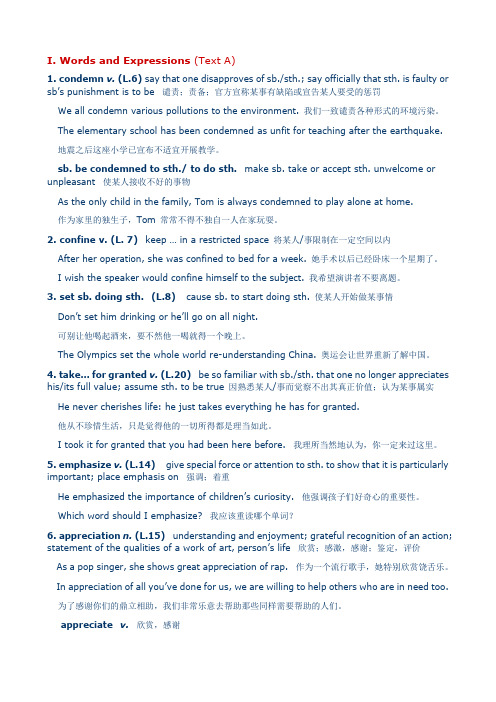
I. Words and Expressions (Text A)1. condemn v.(L.6) say that one disapproves of sb./sth.; say officially that sth. is faulty or sb’s punishment is to be 谴责;责备;官方宣称某事有缺陷或宣告某人要受的惩罚We all condemn various pollutions to the environment. 我们一致谴责各种形式的环境污染。
The elementary school has been condemned as unfit for teaching after the earthquake. 地震之后这座小学已宣布不适宜开展教学。
sb. be condemned to sth./ to do sth. make sb. take or accept sth. unwelcome or unpleasant 使某人接收不好的事物As the only child in the family, Tom is always condemned to play alone at home.作为家里的独生子,Tom 常常不得不独自一人在家玩耍。
2. confine v. (L. 7) keep … in a restricted space 将某人/事限制在一定空间以内After her operation, she was confined to bed for a week. 她手术以后已经卧床一个星期了。
I wish the speaker would confine himself to the subject. 我希望演讲者不要离题。
3. set sb. doing sth. (L.8) cause sb. to start doing sth.使某人开始做某事情Don’t set him drinking or he’ll go on all night.可别让他喝起酒来,要不然他一喝就得一个晚上。